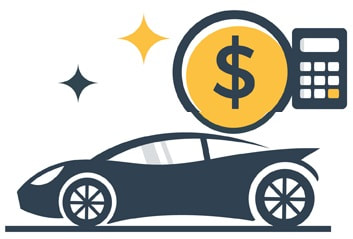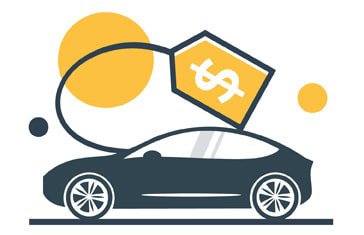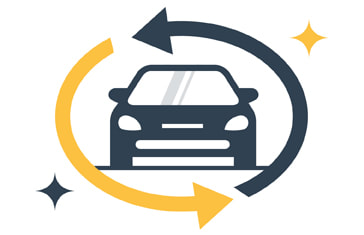Top Cars that Hold Their Value Over Their Life
Our guide explains car depreciation - what factors cause it, how to limit it, and lists five car models that hold their value (relative to other mass-produced cars)
Updated 1 February 2024
Know This First - Why Do Cars Depreciate?
Cars lose value as they age and you drive them. It makes sense since their useful life declines with each kilometre you drive. However, there are ways to avoid the high costs of depreciation by being fully informed when you make a purchase.
Know this: The majority of cars (old and new) depreciate at least 10% when you drive them off the lot. The amount per year can be as much as 15%, which means if you may end up paying $15,000 for something worth $10,000 in four years. Nonetheless, you can protect yourself from the depreciation costs by caring for your car and ensuring it is kept in the best condition. Our guide covers:
Know this: The majority of cars (old and new) depreciate at least 10% when you drive them off the lot. The amount per year can be as much as 15%, which means if you may end up paying $15,000 for something worth $10,000 in four years. Nonetheless, you can protect yourself from the depreciation costs by caring for your car and ensuring it is kept in the best condition. Our guide covers:
Important: What causes a car to depreciate?
Many different factors affect how fast a car depreciates. The reality is that the average car owner has little control over how much (or little) their car depreciates, given each use is for a purpose. We outline the critical depreciation contributors below:
- Mileage: As you drive your car, you wear it down. It doesn’t work as effectively and has a lower useful life for every kilometre you drive. In the beginning, the mileage won’t affect the car’s value too much, but as you get into the higher mileage, the value decreases.
- New models: New car models come out annually; even when you’re buying what feels like the latest model, a newer model is already in production and will be released soon. Every time a new model comes out, older models lose value.
- Reliability: Certain makes and models are more reliable than others. It’s just the consensus that makes this happen. Whether it’s the history of how the car operates or what people think of the car, but it plays a role in the value.
- Overall condition: If a car experiences damage, it decreases the value. Accidents, not taking care of it, and shoddy bodywork can cause a car to be worth less.
- Size: Bigger cars depreciate faster than smaller cars. This is usually because the parts are more expensive, and the car requires more maintenance.
MoneyHub Founder Christopher Walsh shares his views on car depreciation:
|
"Cars depreciate, but you can limit how much you 'lose' by buying the right car and looking after your car. I remember buying a Subaru for $2,000, driving it for ten years, and selling it for $1,500. However, my parents bought a Peugeot for $12,000 and sold it (via a trade-in) for $500 fifteen years later. Sometimes depreciation is unavoidable.
Depreciation is a significant factor in the overall cost of owning a car, but this guide explains that some models hold their value better than others. Generally, popular models from reliable manufacturers often have a higher resale value because they are in demand for their durability and performance. Manufacturers like Toyota, Honda, and Mazda are renowned for producing vehicles that depreciate slower than others. However, depreciation is also driven by vehicle condition, mileage, and market trends. In addition to choosing the right model, properly maintaining your vehicle can also help limit depreciation. Regular maintenance and servicing, keeping the car clean, and avoiding modifications that could negatively impact its value are essential to minimising depreciation. Whatever you decide to do, I strongly suggest reading this guide in detail as it has a lot of must-know tips to help you make an informed decision". |
MoneyHub Founder Christopher Walsh
|
Get a FREE Car Valuation in Seconds with Two Reliable Tools
- We know getting a reliable car valuation can be problematic. To speed up the process, our car valuation research highlighted two tools that provide car valuations free of charge:
- We suggest trying Trade Me's Value My Car tool first, and then the BestCar tool. Both are free of charge.
- If you still need more data points, we suggest searching Trade Me's motoring section to see current prices from other sellers to get an indication of valuation.
- MotorWeb and CarJam also provide (paid) valuation and vehicle history reports - our CarJam Review and CarJam vs MotorWeb Reports has more detail.
- Buying another car? We continue to be made aware of rip-off car finance sold to everyday New Zealanders at car yards - our car finance comparison has everything you need to know about the cost of borrowing so you're prepared upfront.
- Disclaimer: We have no relationship with Trade Me, BestCar or any other car valuation service provider listed on this guide. We suggest getting a number of car valuations before agreeing to either sell or buy a car - estimates range, and the first car valuation you're given may not be the highest (if you're selling a car) or the lowest (if you're buying a car).
|
Christopher Walsh
MoneyHub Founder |
Considering a new car purchase on finance? Avoid costly mistakes with MoneyHub's Top Car Finance Options.
|
Our Three Trusted and Affordable Car Lenders Committed to Fast Quotes:
Five Top Cars That Don’t Depreciate Quickly
Fortunately, some cars have a reputation of not depreciating fast. While other factors affect a car’s value, including mileage and overall condition, these cars depreciate at a slower rate.
The results vary based on where you buy the car, how much you pay for it, and how you treat it, but here’s a shortlist of cars that hold their value sourced from this 2020 Stuff.co.nz research report.
The results vary based on where you buy the car, how much you pay for it, and how you treat it, but here’s a shortlist of cars that hold their value sourced from this 2020 Stuff.co.nz research report.
Suzuki Swift
Our view: Even though you see them at every corner, Suzuki Swifts hold their value. It’s always held its value even as a used car and continues to do so today.
New Pricing: Around $21,000 per Suzuki.co.nz
Used (2015 model) - $18.000 - $23,000 (a Trade Me range as of March 2021)
Car overview: Top Gear Suzuki Swift Review
New Pricing: Around $21,000 per Suzuki.co.nz
Used (2015 model) - $18.000 - $23,000 (a Trade Me range as of March 2021)
Car overview: Top Gear Suzuki Swift Review
Mazda3 Hatchback
Our view: Drivers love the look, and it shows in the Mazda3 Hatchback’s value; it rarely drops. Not only is it a nice looking car, but it runs great too, which helps its value.
New Pricing: Around $37,000 per Mazda.co.nz
Used (2015 model) - $10.000 - $19,000 (a Trade Me range as of March 2021)
Car overview: Top Gear Mazda3 Review
New Pricing: Around $37,000 per Mazda.co.nz
Used (2015 model) - $10.000 - $19,000 (a Trade Me range as of March 2021)
Car overview: Top Gear Mazda3 Review
Toyota Camry
Our view: The Toyota Camry has had a complete overhaul, and drivers love it. Falling within the ‘large car’ category, the Toyota Camry is dependable, attractive, has incredible fuel economy.
New Pricing: Around $42,000 per Toyota.co.nz
Used (2015 model) - $19.000 - $28,000 (a Trade Me range as of March 2021)
Car overview: Top Gear Toyota Camry Review
New Pricing: Around $42,000 per Toyota.co.nz
Used (2015 model) - $19.000 - $28,000 (a Trade Me range as of March 2021)
Car overview: Top Gear Toyota Camry Review
Mazda CX-5
Our view: SUVs often have a hard time holding their value, but Mazda makes our list yet again. The latest version is a hybrid, which is just what drivers want for better fuel economy, and the CX-5 doesn’t have the typical ‘SUV’ look.
New Pricing: From $41,000+ per Mazda.co.nz
Used (2015 model) - $22.000 - $29,000 (a Trade Me range as of March 2021)
Car overview: Top Gear Mazda CX-5 Review
New Pricing: From $41,000+ per Mazda.co.nz
Used (2015 model) - $22.000 - $29,000 (a Trade Me range as of March 2021)
Car overview: Top Gear Mazda CX-5 Review
Toyota Rav4
Our view: Another Toyota graces our list, and it’s a hybrid too. Toyota seems to know what it’s doing with its hybrid models that are frugal yet attractive, creating a car that holds its value.
New Pricing: From $37,000+ per Toyota.co.nz
Used (2015 model) - $18.000 - $23,000 (a Trade Me range as of March 2021)
Car overview: Top Gear Toyota Rav4 Review
New Pricing: From $37,000+ per Toyota.co.nz
Used (2015 model) - $18.000 - $23,000 (a Trade Me range as of March 2021)
Car overview: Top Gear Toyota Rav4 Review
7 Must-Know Tips to Protect Your Car’s Value
All cars depreciate, but that doesn’t mean you're unable to influence how much a car can hold its value. Most people look after their cars and don't drive them into the ground. In many cases, New Zealanders buy a second-hand car, drive it for a few years and then sell it. This is a proven routine that limits the financial burden of owning a car. While you won’t walk away with a profit, you can increase how much you resell the car for.
Our proven tips help keep your car in great shape and hold the value of your car:
Our proven tips help keep your car in great shape and hold the value of your car:
- Keep up with the maintenance. The number one way to ruin a car’s value is to ignore its necessary maintenance. Follow the manufacturer’s recommendations to the letter to keep your car in great shape. This includes oil changes, tune-ups, and major inspections. The more often you have your car maintenance, the earlier mechanics can catch issues and fix them before they cause more damage to the car.
- Keep it clean. Keeping a car’s interior clean is important not only for looks but also for its health. If you keep a messy car, the seats, consoles, and steering wheel will wear down, which decreases a car’s value. Know this - buyers love to bid prices down if there are cosmetic issues. Keep it clean and you won’t have this problem.
- Keep the exterior clean. Take good care of the exterior by washing the car regularly and wax as recommended. Don’t let dirt, dust, sand and/or bird dropping sit on the car. Minor dirt or grime eats away at the paint, which ruins the car’s appearance and lowers its value.
- Protect the car from the elements. If you can, keep the car in a garage or covered area as much as possible. Letting a car sit outside puts it at risk of vandalism or theft and also makes it vulnerable weather elements.
- Keep the features working. If something breaks, have it fixed right away. Even little things like a power window or power seat not working can ruin a car’s value. Once something stops working, it's very easy to accept the fault and work around it. However, this will accelerate the depreciation of your car. Make sure all features work well and don't sit unused and broken.
- Keep the service records. Buyers want proof you kept up with the car’s maintenance. An organized seller will have the car’s maintenance records handy for buyers to reference and see the car was kept in good condition.
- Watch your mileage. Keep your mileage around 12,000 km per year for best results. That's about 230 - 250 km a week, which is significant for any run-around car. If you drive more, your car takes more of a beating which leads to a lower value. If you do drive a lot, be extra vigilant about its maintenance and care.
Get a FREE Car Valuation in Seconds with Two Reliable Tools
- We know getting a reliable car valuation can be problematic. To speed up the process, our car valuation research highlighted two tools that provide car valuations free of charge:
- We suggest trying Trade Me's Value My Car tool first, and then the BestCar tool. Both are free of charge.
- If you still need more data points, we suggest searching Trade Me's motoring section to see current prices from other sellers to get an indication of valuation.
- MotorWeb and CarJam also provide (paid) valuation and vehicle history reports - our CarJam Review and CarJam vs MotorWeb Reports has more detail.
- Buying another car? We continue to be made aware of rip-off car finance sold to everyday New Zealanders at car yards - our car finance comparison has everything you need to know about the cost of borrowing so you're prepared upfront.
- Disclaimer: We have no relationship with Trade Me, BestCar or any other car valuation service provider listed on this guide. We suggest getting a number of car valuations before agreeing to either sell or buy a car - estimates range, and the first car valuation you're given may not be the highest (if you're selling a car) or the lowest (if you're buying a car).
Cars and Depreciation - Frequently Asked Questions
Why do new cars depreciate so much?
Your car goes from a brand new car to a used car the minute you drive it away from the showroom. That difference in ‘status’ makes a big difference in the car’s value. Even if you tried to sell the car two days after you bought it new, it would be worth less than you paid for it. In reality, there's little difference between a new car and one that is two weeks old, but common sense doesn't factor in, hence the huge difference between new and 'used'.
What affects a car’s rate of depreciation?
Many factors affect a car’s depreciation rate, which is why two cars that are the same model and year may have different used prices. Depreciation differs between cars due to common factors such as:
- Mileage - generally, the greater the KM, the lower the price
- Maintenance - engine rumbles, dashboard rattles and temperamental electronics will reduce a car's value.
- Cosmetic appearance - dints, sand damage and paint scratches will devalue a car more than a car disproportionately.
- Make/model - the used car market is, generally, well supplied in New Zealand. Popular vehicle models (in most cases) hold their value as the buyer market is strong. For example, a 2017 Toyota Corolla has a stronger resale market than a 2017 ŠKODA Octavia. This doesn't mean that the Corolla is a better car; the market sets the price.
- Reliability - if the car is a lemon, it will almost always be devalued faster.
How much can you expect your new car to depreciate?
On average, new cars lose 9% - 10% of their value when you drive them off the lot. This varies by make and model, but the average is around 10%. A recent study published in Stuff.co.nz suggested a new car could depreciate as much as 50% in its first year isn't generally reflective of the market, but it will depend on the car. A cautious estimate is 30% depreciation in year one.
Do new cars depreciate faster than used cars?
Yes, new cars depreciate the fastest. Our view is simple - for most people, buying a new car is one of the worst financial decisions they can make. Buying used means someone else has paid a good portion of the depreciation costs.
How much do cars depreciate per year?
On average, cars lose about 20% of their value each year for the first year or two. This slows down as the car gets older, as long as you maintain it.
Is it better to buy last year’s car model?
It depends on the make and model. Some cars have great years where the car is acclaimed, while other years can be disappointing with design faults and poor performance. Finding the right car for your needs ultimately comes down to researching the most suitable options.
When is the best time to buy a new car?
While there isn't a rule, buying a new car at the end of November is often seen as the best time to get a deal. This is the last full month of the year and is the last opportunity before Christmas sets in and people forget about buying cars. Because cars need to be sold and sales quotes met, most dealers give the best deals around late November. If you need a car sooner, try to wait until the end of the month (any month) as the sales team will be looking to cut deals to meet their targets.
How much will a car depreciate in five years?
Most cars depreciate fast until year five. In the first year, your car may lose 20% to 30% of its value. In the next four years, it could lose around 15% per year. However, on average, cars are worth about 50% to 60% of their original sales price after 5 years.
At what mileage do most cars have trouble?
There is no rule or threshold. It used to be that cars stopped working ‘well’ after 150,000 kilometres, but today’s cars can go well into 300,000 kilometres and still run smoothly. The exact mileage that a car stops working ‘well’ depends on the make/model and how you care for it.
Get a FREE Car Valuation in Seconds with Two Reliable Tools
- We know getting a reliable car valuation can be problematic. To speed up the process, our car valuation research highlighted two tools that provide car valuations free of charge:
- We suggest trying Trade Me's Value My Car tool first, and then the BestCar tool. Both are free of charge.
- If you still need more data points, we suggest searching Trade Me's motoring section to see current prices from other sellers to get an indication of valuation.
- MotorWeb and CarJam also provide (paid) valuation and vehicle history reports - our CarJam Review and CarJam vs MotorWeb Reports has more detail.
- Buying another car? We continue to be made aware of rip-off car finance sold to everyday New Zealanders at car yards - our car finance comparison has everything you need to know about the cost of borrowing so you're prepared upfront.
- Disclaimer: We have no relationship with Trade Me, BestCar or any other car valuation service provider listed on this guide. We suggest getting a number of car valuations before agreeing to either sell or buy a car - estimates range, and the first car valuation you're given may not be the highest (if you're selling a car) or the lowest (if you're buying a car).
|
Christopher Walsh
MoneyHub Founder |
Considering a new car purchase on finance? Avoid costly mistakes with MoneyHub's Top Car Finance Options.
|
Our Three Trusted and Affordable Car Lenders Committed to Fast Quotes:
Related Guides
- Buying a Used Car
- 20 Ways to Make Driving Cheaper
- Car Valuations
- CarJam Review
- CarJam vs MotorWeb Reports
- Best Electric Cars
- Parking Tickets
- Selling a Car
- AA Membership Review
- Vehicle Leasing
- Best Car Batteries
- Warrant of Fitness Guide - Auckland, Hamilton, Tauranga, Lower Hutt, Wellington, Christchurch and Dunedin
- Mechanics in Auckland, Hamilton, Tauranga, Lower Hutt, Wellington, Christchurch and Dunedin















